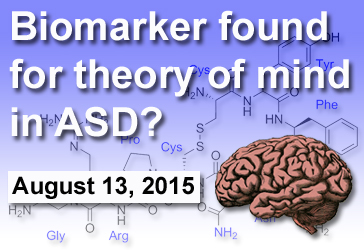Check out other stories from the Latest News
Level of Hormone Predicts Theory of Mind Ability in ASD
By Shana R. Spindler, Ph.D. on August 13, 2015

Background: Difficulty with social functions is a defining characteristic of Autism Spectrum Disorder (ASD). Hormones in the brain, such as oxytocin and arginine vasopressin, play an important role in regulating social behaviors in humans and other mammals. While several studies have focused on the potential role for oxytocin in the diagnosis and treatment of ASD, few investigations have centered on arginine vasopressin.
What’s new: On July 22, 2015, the online journal PLOS ONE published a study examining the relationship between blood levels of arginine vasopressin (AVP) and social abilities in those with ASD, their siblings, and neurotypical controls. The researchers first confirmed that blood levels of AVP predicted brain levels of the hormone. Next, they found that ASD individuals with lower blood levels of AVP have decreased Theory of Mind—the ability to interpret another’s intensions and emotions. This correlation is specific only to Theory of Mind ability, as AVP blood levels did not predict other social function scores.
Why it’s important: ASD is a heterogeneous condition—individuals along the spectrum have varying degrees and combinations of symptoms. Consequently, there is individual variability in Theory of Mind. Having a biomarker for this nearly universal feature of ASD will be important for diagnosis and treatment selection. This study suggests that the blood level of arginine vasopressin could be a biomarker for theory of mind ability in individuals with autism.
Help me understand :
| Source(s) : |
| Tweet |

